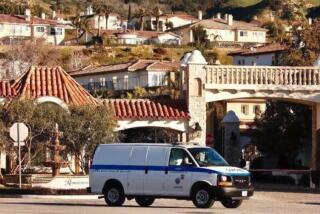Plane Suspect Held Without Bail
- Share via
BOSTON — A federal judge on Monday ordered a man suspected of trying to detonate explosives aboard a Paris-to-Miami flight held without bail, as authorities on both sides of the Atlantic struggled to learn more about the mysterious passenger and his motives.
A bedraggled Richard C. Reid gave only a few one-word answers during his brief court appearance, where federal prosecutors urged that the 28-year-old British citizen be held until a detention hearing Friday. They told U.S. Magistrate Judith Dein that Reid was “dangerous” and that they needed time to find out more about him. She agreed without comment.
After the hearing, Boston’s top FBI official and federal prosecutor said that authorities found explosives in both of Reid’s high-top sneakers when he was arrested Saturday, after the jetliner he was on made an emergency landing, escorted by Air Force F-15s, at Logan International Airport.
Reid’s alleged attempt to light the tongue of one of those shoes, or some kind of wire sticking out of it, set off a near-melee at 30,000 feet Saturday--and alarm bells that reached the White House and counterterrorism agencies worldwide.
Either one of the explosive devices could have been detonated without any additional assembly work, potentially blowing a hole in the crowded American Airlines Boeing 767 and jeopardizing the lives of all 197 aboard Flight 63, said Charles Prouty, who heads the FBI’s Boston office.
“It didn’t need anything else,” Prouty said of each of the two similar explosive mechanisms. Each, he said, “was a complete functional device.”
If Reid had managed to detonate one or both of them, Prouty said, “It would have resulted in significant damage, and we did avert a major disaster.”
The FBI continued to work with its counterparts in Britain, France and elsewhere to delve into Reid’s background and his recent activities.
But a senior FBI official in Washington acknowledged that essential questions remained about Reid’s identity and why he was attempting to light his explosives-filled sneaker.
“It’s a mystery,” the official said late Monday. “We have a lot of legwork ahead of us. We just don’t know a lot at this point.”
The Sri Lankan government said Tuesday that Reid is not a citizen of its country. French authorities had identified him as a Sri Lankan named Tariq Raja.
On Saturday, a Massachusetts official said the explosives found in Reid’s shoes were a putty-like substance “consistent with” C-4, which terrorists affiliated with Osama bin Laden’s Al Qaeda network used to blow up the U.S. destroyer Cole last year in Yemen, killing 17 sailors. The material is not commonly available.
A federal official said the shoes appeared to contain “some kind of plastique,” or plastic explosives.
At the heart of the multinational investigation is whether Reid is a terrorist who was acting alone or in concert with others; someone with a grudge or a need for attention; or a deranged individual.
Prouty and U.S. Atty. Michael Sullivan would not comment on whether Reid was cooperating with authorities. He was being held under constant watch in a jail in nearby Plymouth, Mass., and was being questioned by members of Boston’s Joint Terrorism Task Force.
Authorities here and abroad continued to assert Monday that they have found no links between Reid and terrorist organizations, even though they continue to pursue such potential connections.
“The FBI is conducting a very thorough investigation; we’re considering every possibility,” Prouty said.
Reid appeared in court wearing an orange Plymouth County jail jumpsuit and plastic sandals. He was shackled at the wrists and ankles, and slumped forward in his chair during the brief procedure.
When the magistrate asked Reid if he was aware of the seriousness of the felony charges against him--interfering with a flight crew through assault or intimidation--he shrugged his shoulders and bobbed his head sideways.
“Is that a yes?” Dein asked.
“Yeah,” Reid responded softly.
Dein approved Reid’s request for a public defender and ordered him to appear Friday.
If convicted, Reid faces a maximum sentence of 20 years in prison, three years of supervised release and a $250,000 fine. Authorities also said Monday that they expect to file additional charges against him. Reid also is undergoing a routine psychiatric evaluation.
Also Monday, French investigators questioned the border police officer who had interrogated Reid on Friday. The suspect was referred to French police at the airport by American Airlines security personnel, who said he fit a suspicious profile. The officer finally cleared Reid, but by that time he had missed his flight. He returned Saturday to catch Flight 63.
French police said Reid told authorities that he had spent time in Brussels, where he was issued a British passport three weeks ago. There were indications he had also spent time in the Netherlands.
To verify his identity, French police checked Reid’s fingerprints against those on a receipt he had been issued by the British consulate when he obtained the new passport, according to French police and media reports. The fingerprints matched and the passport was deemed valid; Reid was also carrying his old British passport, which had expired in July, French authorities said Monday.
Reid told his interrogator that he was going to visit family on the Caribbean island of Antigua. French officials did not say whether Reid wore the same sneakers during Friday’s attempt to board that he wore onto the plane Saturday.
There also was conflicting information about Reid’s airplane ticket. Initially it was said to be a one-way ticket, but reports Monday indicated that it was a round-trip ticket from Paris to Antigua via Miami.
So far, European investigators have not established ties between Reid and known Islamic terrorist organizations in Europe such as Al Qaeda, a West European police official said. The suspect’s movement between London and Brussels is intriguing because both cities are considered hubs of that terrorist network, the official said. The manner in which he obtained a new passport away from home and the use of explosives in shoes recalls past tactics by Al Qaeda terrorists.
On the other hand, the apparently primitive bomb and descriptions of Reid as a disoriented, marginal character suggest that he could have acted on his own, perhaps incited by extremist Islamic ideas.
*
Meyer reported from Boston, Rotella from Paris. Times staff writer John J. Goldman in Boston also contributed to this report.
More to Read
Sign up for Essential California
The most important California stories and recommendations in your inbox every morning.
You may occasionally receive promotional content from the Los Angeles Times.













